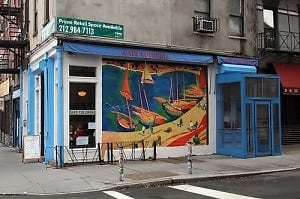 The restaurant's on Houston between Bowery and Elizabeth, a block "in transition, as stylish boutiques move in next to old-fashioned meat markets...Longtime residents still sit on the sidewalk in lawn chairs...even as...fashion's leading edge sip drinks at a gallery opening next door." Must be Pulino's in 2010, right?
The restaurant's on Houston between Bowery and Elizabeth, a block "in transition, as stylish boutiques move in next to old-fashioned meat markets...Longtime residents still sit on the sidewalk in lawn chairs...even as...fashion's leading edge sip drinks at a gallery opening next door." Must be Pulino's in 2010, right?
Actually, it's Cafe Colonial in a Times review from 1998.
Cafe Colonial closed yesterday after 15 years near the crossroads of Nolita, the East Village and the Lower East Side. Fans, nostalgic locals and bloggers pinned its shuttering on increasing rents in a neighborhood in transition. Pulino's, an upscale, yuppie--yupscale? up-yup?--pizzeria from trendmaster Keith McNally that just opened down the street bore the brunt of the blame.
But 12 years ago, Cafe Colonial had a lot more in common with Pulino's than it would probably care to admit now. At least, it withstood some of the same gripes currently being hurled at its new neighbor.
Here's how Eric Asimov opened his (very positive) review:
"Perched as it is on the edge of a newly trendy neighborhood and serving a menu of indeterminate ethnicity to a fashionable crowd, it could easily be a cliche of bad food and worse attitude."
The more things change, right? As much as New Yorkers love to mythologize the city's past, dementia often sets in when it comes to a time before they arrived.
Artsy pioneers who "discovered" Williamsburg a dozen years ago moan about the high-rises dotting its waterfront today. But the lower-middle class Puerto Ricans those people displaced in the mid-'90s probably aren't too fond of the proto-hipsters. And that's not to mention the Hasids!
Same goes for the mohawked trailblazers who made the East Village cooler than it had been in its Little Ukraine days and then cried foul when more traditionally groomed white Americans displaced them, as if CBGB was the first structure to break ground on area farmland in 1973.
People often say that change is the only constant in New York City. But moaning about change is an equally established pastime. And if the businesses who contribute to that change feel ambushed by the backlash, don't worry: you'll be mourned when the next new kid on the block shuts you down.
Photo via Glide


.jpg)
.jpg)



.jpg)
.jpg)
.jpg)




